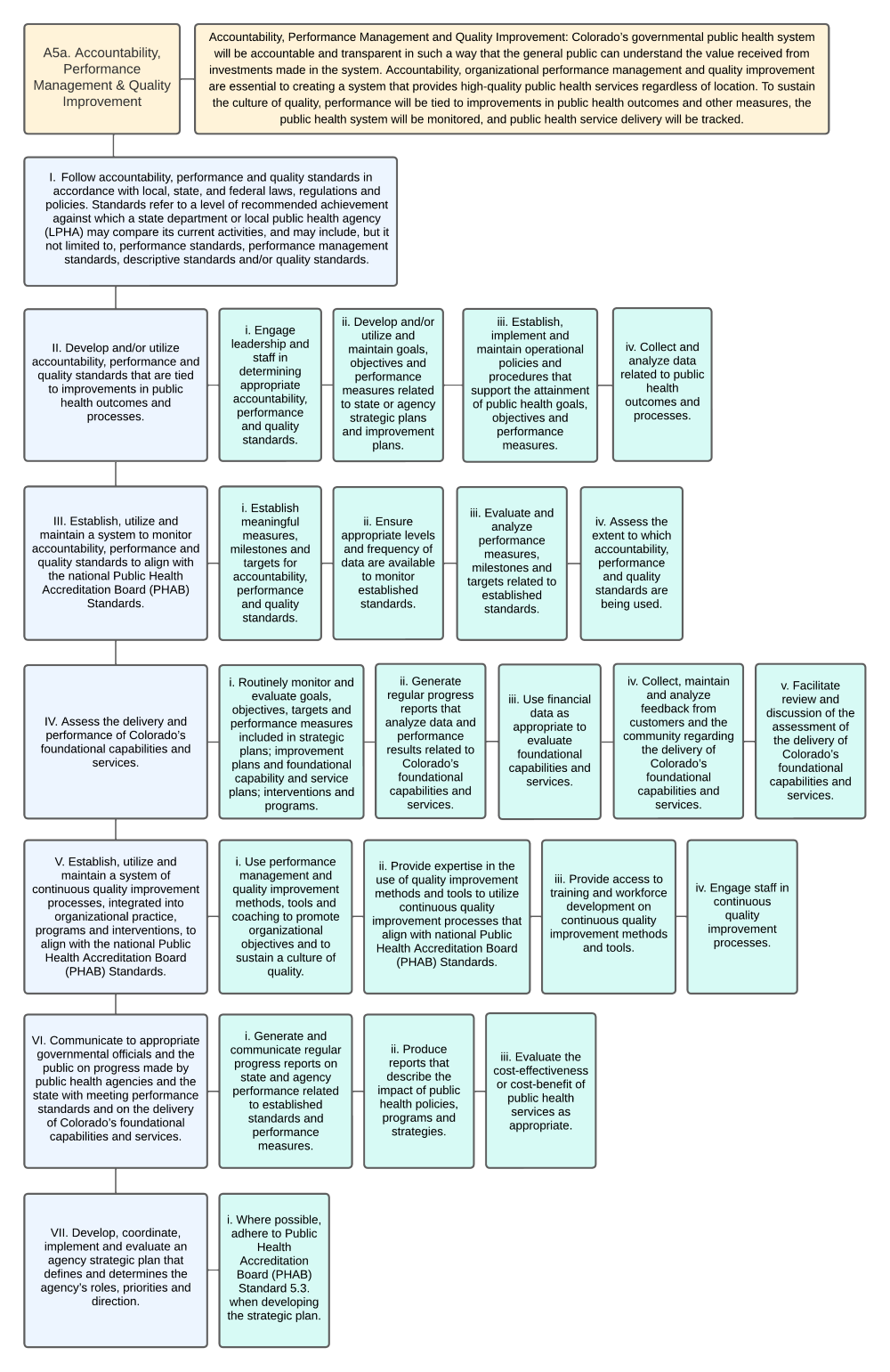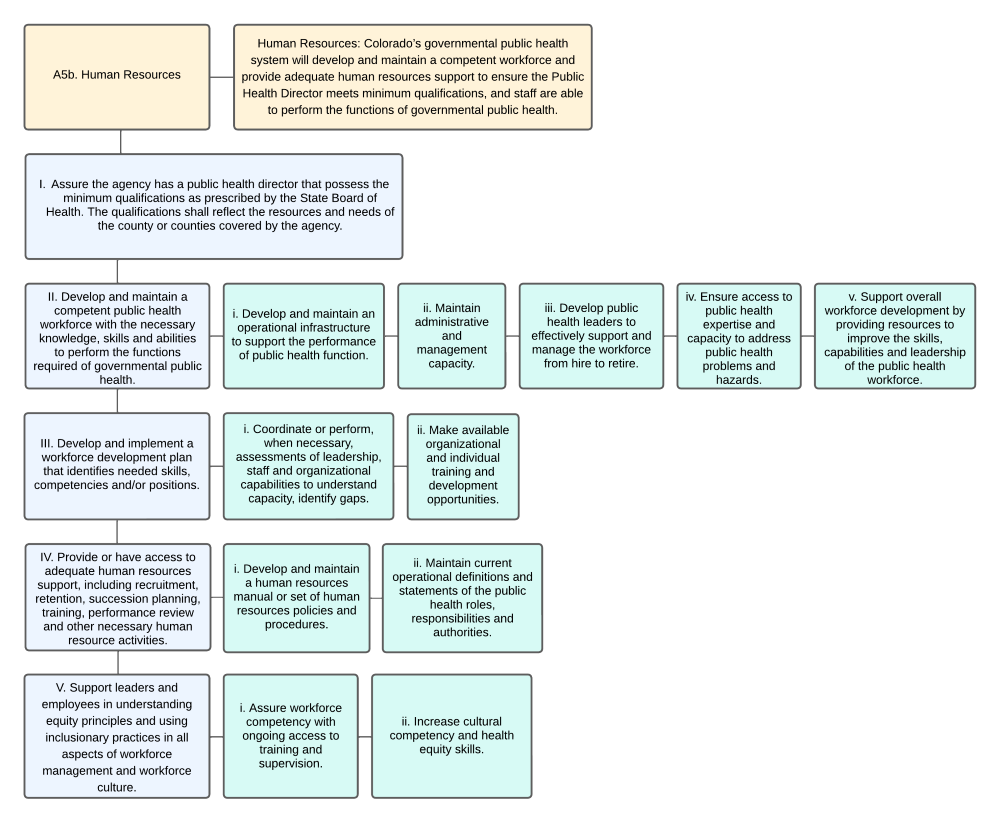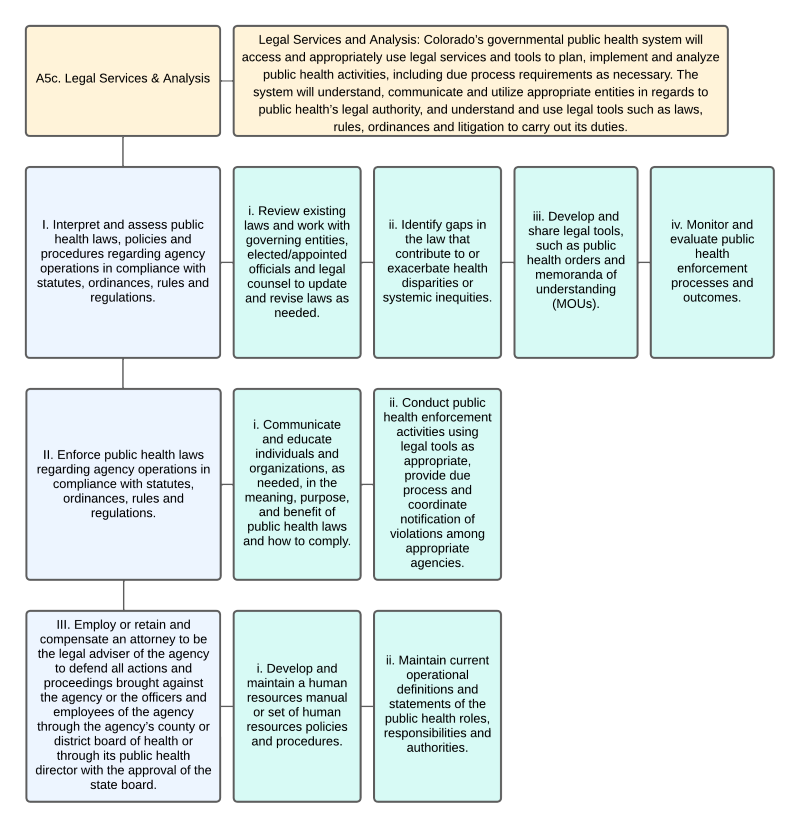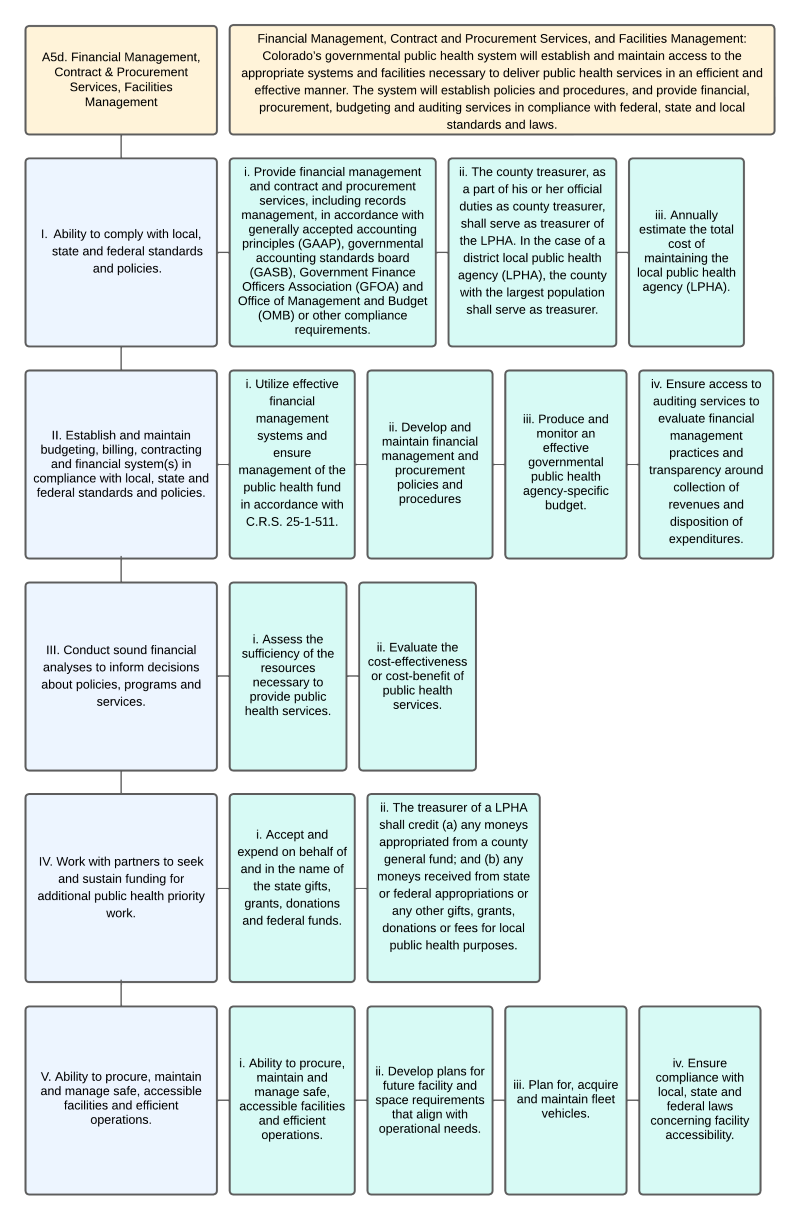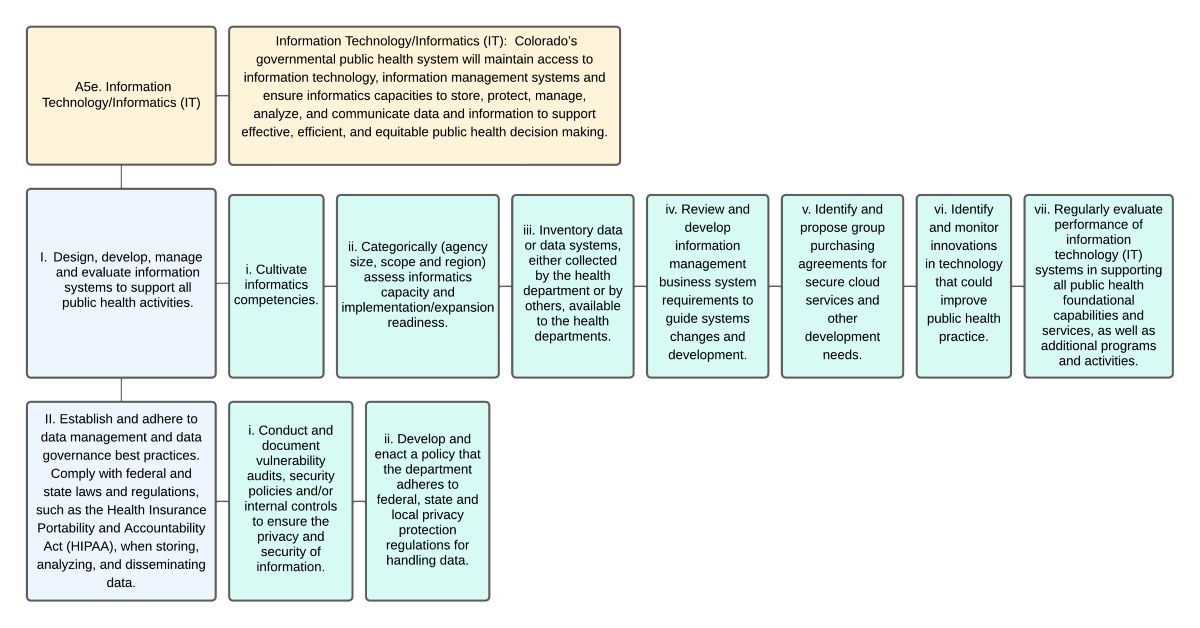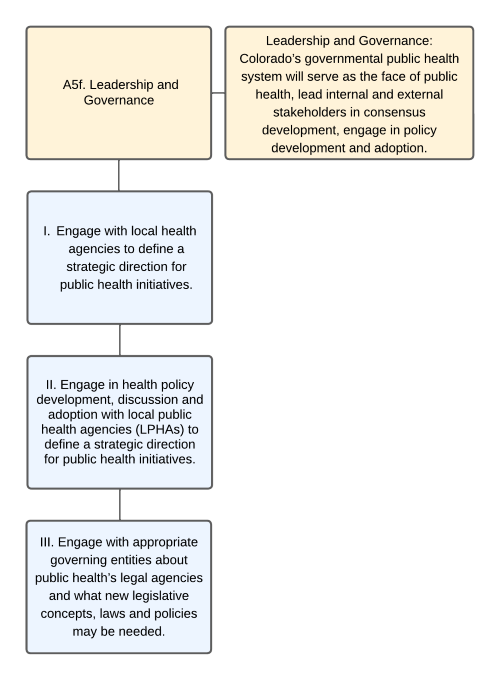A5. Organizational Competencies
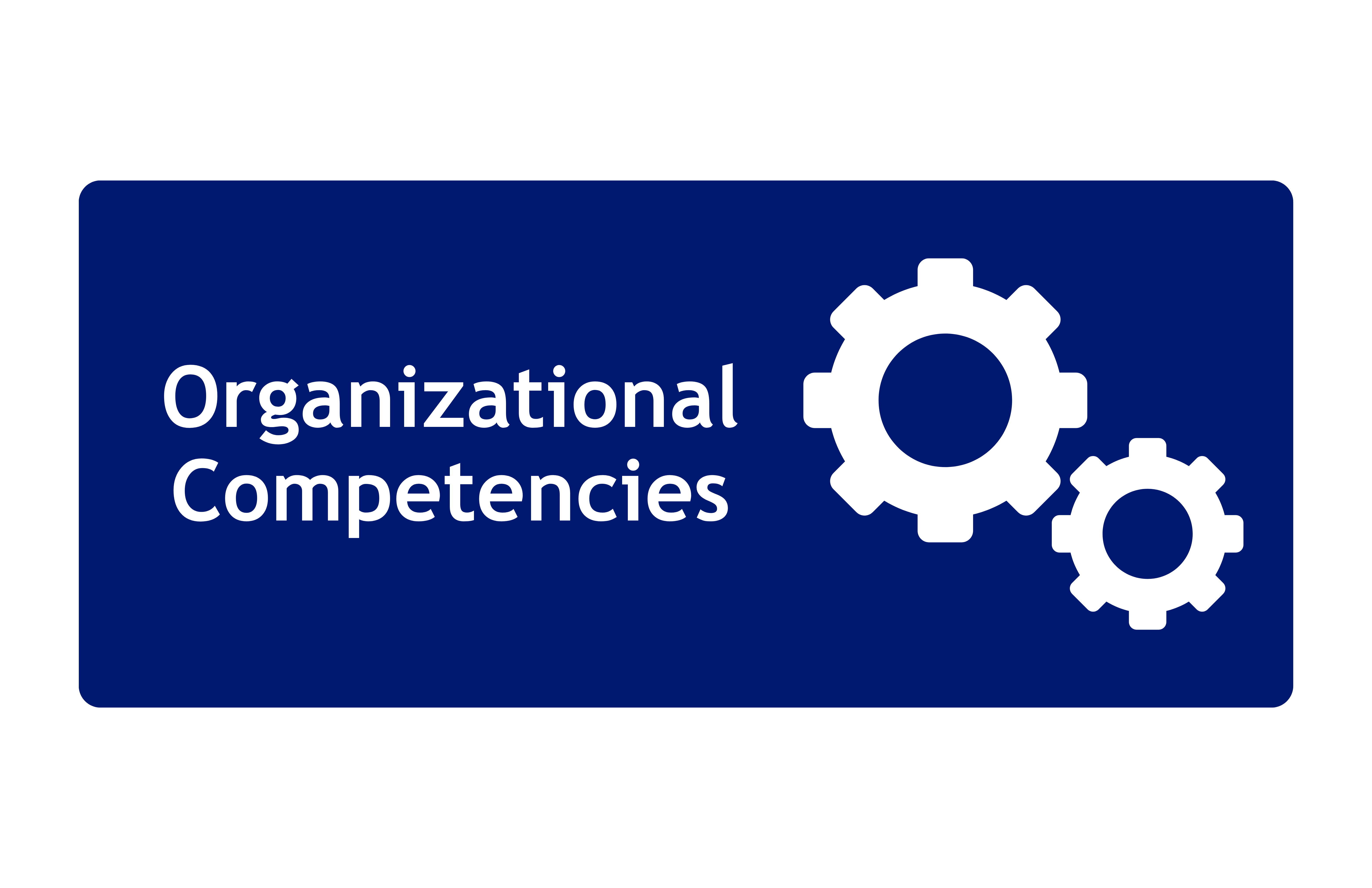
Organizational Competencies
Link:
The source Core Public Health Services Operational Definitions Manual 2019 is organized as follows:
|
Functions of Organizational Competencies
A5a. Accountability, Performance Management and Quality Improvement: Colorado’s governmental public health system will be accountable and transparent in such a way that the general public can understand the value received from investments made in the system.
Accountability, organizational performance management and quality improvement are essential to creating a system that provides high-quality public health services regardless of location.
To sustain the culture of quality, performance will be tied to improvements in public health outcomes and other measures, the public health system will be monitored, and public health service delivery will be tracked.
I. Follow accountability, performance and quality standards in accordance with local, state, and federal laws, regulations and policies. Standards refer to a level of recommended achievement against which a state department or local public health agency (LPHA) may compare its current activities, and may include, but it not limited to, performance standards, performance management standards, descriptive standards and/or quality standards.
II. Develop and/or utilize accountability, performance and quality standards that are tied to improvements in public health outcomes and processes.
i. Engage leadership and staff in determining appropriate accountability, performance and quality standards.
ii. Develop and/or utilize and maintain goals, objectives and performance measures related to state or agency strategic plans and improvement plans.
iii. Establish, implement and maintain operational policies and procedures that support the attainment of public health goals, objectives and performance measures.
iv. Collect and analyze data related to public health outcomes and processes.
III. Establish, utilize and maintain a system to monitor accountability, performance and quality standards to align with the national Public Health Accreditation Board (PHAB) Standards.
i. Establish meaningful measures, milestones and targets for accountability, performance and quality standards.
ii. Ensure appropriate levels and frequency of data are available to monitor established standards.
iii. Evaluate and analyze performance measures, milestones and targets related to established standards.
iv. Assess the extent to which accountability, performance and quality standards are being used.
IV. Assess the delivery and performance of Colorado’s foundational capabilities and services.
i. Routinely monitor and evaluate goals, objectives, targets and performance measures included in strategic plans; improvement plans and foundational capability and service plans; interventions and programs.
ii. Generate regular progress reports that analyze data and performance results related to Colorado’s foundational capabilities and services.
iii. Use financial data as appropriate to evaluate foundational capabilities and services. iv. Collect, maintain and analyze feedback from customers and the community regarding the delivery of Colorado’s foundational capabilities and services.
v. Facilitate review and discussion of the assessment of the delivery of Colorado’s foundational capabilities and services.
V. Establish, utilize and maintain a system of continuous quality improvement processes, integrated into organizational practice, programs and interventions, to align with the national Public Health Accreditation Board (PHAB) Standards.
i. Use performance management and quality improvement methods, tools and coaching to promote organizational objectives and to sustain a culture of quality.
ii. Provide expertise in the use of quality improvement methods and tools to utilize continuous quality improvement processes that align with national Public Health Accreditation Board (PHAB) Standards.
iii. Provide access to training and workforce development on continuous quality improvement methods and tools.
iv. Engage staff in continuous quality improvement processes.
VI. Communicate to appropriate governmental officials and the public on progress made by public health agencies and the state with meeting performance standards and on the delivery of Colorado’s foundational capabilities and services.
i. Generate and communicate regular progress reports on state and agency performance related to established standards and performance measures.
ii. Produce reports that describe the impact of public health policies, programs and strategies.
iii. Evaluate the cost-effectiveness or cost-benefit of public health services as appropriate.
V. Develop, coordinate, implement and evaluate an agency strategic plan that defines and determines the agency’s roles, priorities and direction.
i. Where possible, adhere to Public Health Accreditation Board (PHAB) Standard 5.3. when developing the strategic plan.
Links:
A5b. Human Resources: Colorado’s governmental public health system will develop and maintain a competent workforce and provide adequate human resources support to ensure the Public Health Director meets minimum qualifications, and staff are able to perform the functions of governmental public health.
I. Assure the agency has a public health director that possess the minimum qualifications as prescribed by the State Board of Health. The qualifications shall reflect the resources and needs of the county or counties covered by the agency.
II. Develop and maintain a competent public health workforce with the necessary knowledge, skills and abilities to perform the functions required of governmental public health.
i. Develop and maintain an operational infrastructure to support the performance of public health function.
ii. Maintain administrative and management capacity.
iii. Develop public health leaders to effectively support and manage the workforce from hire to retire.
iv. Ensure access to public health expertise and capacity to address public health problems and hazards.
v. Support overall workforce development by providing resources to improve the skills, capabilities and leadership of the public health workforce.
III. Develop and implement a workforce development plan that identifies needed skills, competencies and/or positions.
i. Coordinate or perform, when necessary, assessments of leadership, staff and organizational capabilities to understand capacity, identify gaps.
ii. Make available organizational and individual training and development opportunities.
IV. Provide or have access to adequate human resources support, including recruitment, retention, succession planning, training, performance review and other necessary human resource activities.
i. Develop and maintain a human resources manual or set of human resources policies and procedures.
ii. Maintain current operational definitions and statements of the public health roles, responsibilities and authorities.
V. Support leaders and employees in understanding equity principles and using inclusionary practices in all aspects of workforce management and workforce culture.
i. Assure workforce competency with ongoing access to training and supervision.
ii. Increase cultural competency and health equity skills.
A5c. Legal Services and Analysis: Colorado’s governmental public health system will access and appropriately use legal services and tools to plan, implement and analyze public health activities, including due process requirements as necessary.
The system will understand, communicate and utilize appropriate entities in regards to public health’s legal authority, and understand and use legal tools such as laws, rules, ordinances and litigation to carry out its duties.
I. Interpret and assess public health laws, policies and procedures regarding agency operations in compliance with statutes, ordinances, rules and regulations.
i. Review existing laws and work with governing entities, elected/appointed officials and legal counsel to update and revise laws as needed.
ii. Identify gaps in the law that contribute to or exacerbate health disparities or systemic inequities.
iii. Develop and share legal tools, such as public health orders and memoranda of understanding (MOUs).
iv. Monitor and evaluate public health enforcement processes and outcomes.
II. Enforce public health laws regarding agency operations in compliance with statutes, ordinances, rules and regulations.
i. Communicate and educate individuals and organizations, as needed, in the meaning, purpose, and benefit of public health laws and how to comply.
ii. Conduct public health enforcement activities using legal tools as appropriate, provide due process and coordinate notification of violations among appropriate agencies.
III. Employ or retain and compensate an attorney to be the legal adviser of the agency to defend all actions and proceedings brought against the agency or the officers and employees of the agency through the agency’s county or district board of health or through its public health director with the approval of the state board.
A5d. Financial Management, Contract and Procurement Services, and Facilities Management: Colorado’s governmental public health system will establish and maintain access to the appropriate systems and facilities necessary to deliver public health services in an efficient and effective manner.
The system will establish policies and procedures, and provide financial, procurement, budgeting and auditing services in compliance with federal, state and local standards and laws.
I. Ability to comply with local, state and federal standards and policies.
i. Provide financial management and contract and procurement services, including records management, in accordance with generally accepted accounting principles (GAAP), governmental accounting standards board (GASB), Government Finance Officers Association (GFOA) and Office of Management and Budget (OMB) or other compliance requirements.
ii. The county treasurer, as a part of his or her official duties as county treasurer, shall serve as treasurer of the LPHA. In the case of a district local public health agency (LPHA), the county with the largest population shall serve as treasurer.
iii. Annually estimate the total cost of maintaining the local public health agency (LPHA).
II. Establish and maintain budgeting, billing, contracting and financial system(s) in compliance with local, state and federal standards and policies.
i. Utilize effective financial management systems and ensure management of the public health fund in accordance with C.R.S. 25-1-511.
ii. Develop and maintain financial management and procurement policies and procedures.
iii. Produce and monitor an effective governmental public health agency-specific budget. iv. Ensure access to auditing services to evaluate financial management practices and transparency around collection of revenues and disposition of expenditures.
III. Conduct sound financial analyses to inform decisions about policies, programs and services.
i. Assess the sufficiency of the resources necessary to provide public health services.
ii. Evaluate the cost-effectiveness or cost-benefit of public health services.
IV. Work with partners to seek and sustain funding for additional public health priority work.
i. Accept and expend on behalf of and in the name of the state gifts, grants, donations and federal funds.
ii. The treasurer of a LPHA shall credit (a) any moneys appropriated from a county general fund; and (b) any moneys received from state or federal appropriations or any other gifts, grants, donations or fees for local public health purposes.
V. Ability to procure, maintain and manage safe, accessible facilities and efficient operations.
i. Ability to procure, maintain and manage safe, accessible facilities and efficient operations.
ii. Develop plans for future facility and space requirements that align with operational needs.
iii. Plan for, acquire and maintain fleet vehicles.
iv. Ensure compliance with local, state and federal laws concerning facility accessibility.
A5e. Information Technology/Informatics (IT): Colorado’s governmental public health system will maintain access to information technology, information management systems and ensure informatics capacities to store, protect, manage, analyze, and communicate data and information to support effective, efficient, and equitable public health decision making.
I. Design, develop, manage and evaluate information systems to support all public health activities.
i. Cultivate informatics competencies.
ii. Categorically (agency size, scope and region) assess informatics capacity and implementation/expansion readiness.
iii. Inventory data or data systems, either collected by the health department or by others, available to the health departments.
iv. Review and develop information management business system requirements to guide systems changes and development.
v. Identify and propose group purchasing agreements for secure cloud services and other development needs.
vi. Identify and monitor innovations in technology that could improve public health practice.
vii. Regularly evaluate performance of information technology (IT) systems in supporting all public health foundational capabilities and services, as well as additional programs and activities.
II. Establish and adhere to data management and data governance best practices. Comply with federal and state laws and regulations, such as the Health Insurance Portability and Accountability Act (HIPAA), when storing, analyzing, and disseminating data.
i. Conduct and document vulnerability audits, security policies and/or internal controls to ensure the privacy and security of information.
ii. Develop and enact a policy that the department adheres to federal, state and local privacy protection regulations for handling data.
A5f. Leadership and Governance: Colorado’s governmental public health system will serve as the face of public health, lead internal and external stakeholders in consensus development, engage in policy development and adoption.
I. Engage with local health agencies to define a strategic direction for public health initiatives.
II. Engage in health policy development, discussion and adoption with local public health agencies (LPHAs) to define a strategic direction for public health initiatives.
III. Engage with appropriate governing entities about public health’s legal agencies and what new legislative concepts, laws and policies may be needed.
